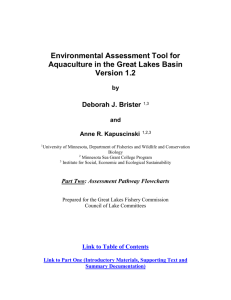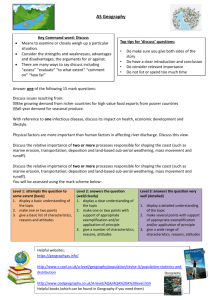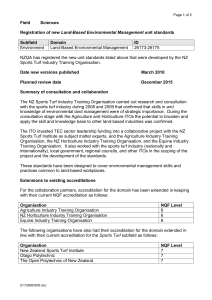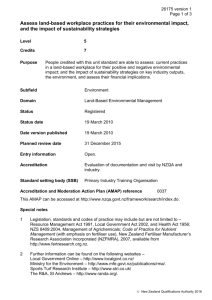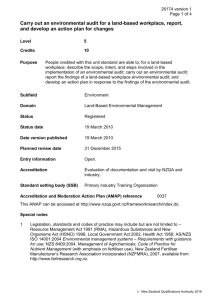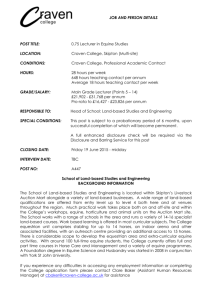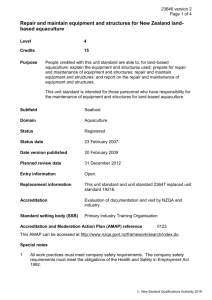Good practice in land-based education and training
advertisement
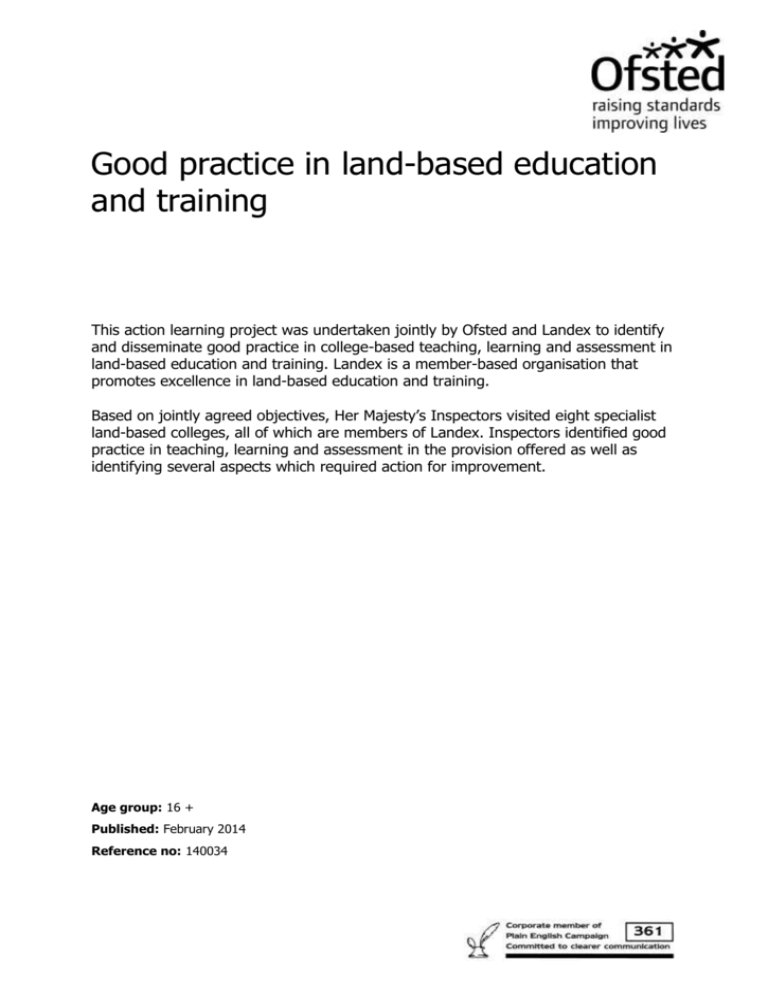
Good practice in land-based education and training This action learning project was undertaken jointly by Ofsted and Landex to identify and disseminate good practice in college-based teaching, learning and assessment in land-based education and training. Landex is a member-based organisation that promotes excellence in land-based education and training. Based on jointly agreed objectives, Her Majesty’s Inspectors visited eight specialist land-based colleges, all of which are members of Landex. Inspectors identified good practice in teaching, learning and assessment in the provision offered as well as identifying several aspects which required action for improvement. Age group: 16 + Published: February 2014 Reference no: 140034 The Office for Standards in Education, Children's Services and Skills (Ofsted) regulates and inspects to achieve excellence in the care of children and young people, and in education and skills for learners of all ages. It regulates and inspects childcare and children's social care, and inspects the Children and Family Court Advisory Support Service (Cafcass), schools, colleges, initial teacher training, work-based learning and skills training, adult and community learning, and education and training in prisons and other secure establishments. It assesses council children’s services, and inspects services for looked after children, safeguarding and child protection. If you would like a copy of this document in a different format, such as large print or Braille, please telephone 0300 123 1231, or email enquiries@ofsted.gov.uk. You may reuse this information (not including logos) free of charge in any format or medium, under the terms of the Open Government Licence. To view this licence, visit www.nationalarchives.gov.uk/doc/open-government-licence/, write to the Information Policy Team, The National Archives, Kew, London TW9 4DU, or email: psi@nationalarchives.gsi.gov.uk. This publication is available at www.ofsted.gov.uk/resources/140034. To receive regular email alerts about new publications, including survey reports and school inspection reports, please visit our website and go to ‘Subscribe’. Piccadilly Gate Store Street Manchester M1 2WD T: 0300 123 1231 Textphone: 0161 618 8524 E: enquiries@ofsted.gov.uk W: www.ofsted.gov.uk No. 140034 © Crown copyright 2014 Contents Executive summary 4 Methodology 4 Good practice 6 Practice in need of further improvement 13 Recommendations 14 Sector subject area 3: Agriculture, horticulture and animal care 15 About Landex 15 Annex A: Colleges visited 16 Annex B: Links 16 Executive summary The eight colleges that inspectors visited for this action learning project have strong links with the land-based sector and they use these links very well to enhance the teaching, learning and assessment that their students receive. Inspectors found numerous examples of how managers and staff developed and sustained productive partnerships with land-based employers and stakeholders. These partnerships frequently resulted in an enhanced learning experience for a wide range of students from across ability groups and opened up valuable progression opportunities for them. The partnerships were mutually beneficial: for example, college staff benefited from updates about the sector provided by industry partners, and employers often influenced curriculum development to ensure that the provision also met their needs. The teachers at these colleges frequently used their wide land-based experience and industrial credibility very well to motivate students to learn practical and employability skills and quickly to become ready for work. Teachers maximised the opportunities offered by the extensive and often very high-quality resources available at the land-based colleges. Through a coherent and broad curriculum, they structured students’ learning carefully and well across a range of learning activities, including routine practical duties, practical work with external partners, project-based activities that had a commercial aspect and theory learning. However, they did not always ensure that classroom-based teaching and learning was innovative, creative and demanding enough to help students, particularly the more able, to reach their full academic potential. Some aspects of teachers’ use of assessment were very effective, such as the use of project-based assessment, but other aspects such as the use of information and learning technology as part of ongoing assessment required improvement. The managers and staff at the colleges visited recognised the importance of developing students’ wider skills and often ensured good development of skills such as communication, the ability to work in teams and leadership skills through many of the learning activities they provided for students. Inspectors found some good practice where teachers were beginning to emphasise the importance of students’ English and mathematical skills development, but this was not widespread enough, particularly in English. Landex, through its mission and values, contributions from its membership and its operational structure, provides a substantial amount of support for members and promotes good practice in a wide range of ways. Peer review activities organised through Landex contribute very positively to developing and sharing good practice and the approach used has a number of strengths in terms of standardisation, sustainability and rigour. Methodology During the autumn term 2013, three of Her Majesty’s Inspectors between them visited eight specialist land-based colleges for a day. On each visit, inspectors were accompanied by two managers from other colleges that are members of Landex. In 4 Good practice in land-based education February 2014, No. 140034 addition, on most visits one or more managers from the host college accompanied inspectors. The colleges were selected for participation in the project by Landex members. At the time of the visits the inspection grades of all of the eight colleges were good or outstanding. The jointly agreed project objectives are shown below: to evaluate the challenging factors in improving teaching, learning and assessment on land-based courses with a particular emphasis on the development of vocational and employability skills to identify good practice in land-based teaching and the use of the land-based resources, including commercial enterprises, as a basis for teaching, learning and assessment of practical skills and knowledge to identify good practice in the use of extra-curricular work including on-site practical work to support students’ progression and development of their practical and employment skills to help guide Ofsted’s improvement work with the land-based sector. In planning the visits, inspectors identified jointly with Landex members the following five main areas for investigation. These areas arose out of discussions about the challenging factors facing the land-based sector. Managers at each of the colleges visited selected and presented aspects of good practice to inspectors and visiting managers for evaluation that reflected some or all of these areas. How students’ confidence, resilience, ability to work independently and their landbased skills are developed so that they can progress easily and successfully into land-based industries in which many work settings are hazardous and involve high-cost and complex resources as well as the welfare of animals. How well are land-based resources, which are often extensive and can include commercial operations, used successfully to ensure that students have a full and realistic learning experience of land-based specialist work? To what extent do external resources and the role of employers contribute to learning? How effectively do land-based teachers use assessment methods to ensure that learning is checked, built upon and consolidated? Does assessment extend sufficiently beyond solely assessing competence in land-based skills, to support learning of wider skills and knowledge? How well do land-based teachers support students’ development of vocationally relevant English and mathematics? Peer review is used widely within Landex to promote the sharing of good practice as well as improving the quality of provision and developing capacity and sustainability. What are the key features of this work in relation to teaching, learning and assessment and what impact has it had on improving students’ experiences? Good practice in land-based education February 2014, No. 140034 5 Good practice In the land-based specialist colleges visited as part of the project, inspectors noted the following eight main aspects where good practice was evident. An evaluation of each of these areas is provided in this section, including examples of the good practice. In addition, inspectors considered two areas of work undertaken through Landex membership to be highly beneficial to this subject area. The section includes an evaluation of them. 1. A very strong focus on developing students’ skills for employment through practical teaching which supports their progression into landbased employment. All staff are clear from mission statements that the main focus is on developing students’ employability and supporting their progression to employment and this is emphasised consistently by senior managers. The importance of employability is emphasised to students from the outset of courses and they understand and appreciate the significance of this. Teachers and other staff frequently use industry examples in teaching and often remind students of the relevance of the commercial context to their learning. Staff involve students in all aspects of the routine work within land-based units and ensure that students meet their high expectations of matching and often exceeding industry requirements. Students undertake routine practical work across a wide range of landbased operations, including: farms; equestrian centres; animal units; wildlife habitats, including game management; food technology units; estates, including formal landscaped areas; forestry and retail horticultural units. Because of the extent of practical operations that are undertaken across each college’s curriculum, students can gain experience beyond their specialist interests and broaden their understanding of the land-based sector. Staff ensure that students safely gain a high awareness of, and plenty of exposure to, the risks and hazards that are part of the land-based sector through real-life tasks such as using large and powerful machinery; riding different types of horses; handling a wide range of animals that includes those that are potentially dangerous, such as poisonous snakes, or nervous and unpredictable animals such as young horses or cattle. College estates are often used constructively to provide valuable extracurricular opportunities, including paid work, for students to gain extra work experience; and through this they benefit from working alongside experienced land-based workers. Staff ensure that employment skills such as teamwork, leadership, problemsolving and communication skills are developed consistently through 6 Good practice in land-based education February 2014, No. 140034 practical work and other activities. The significance of these skills is reinforced regularly by all staff. Examples of good practice from the colleges visited In the first week of term, students learn a few basic land-based skills very quickly, such as basic animal handling, routine feeding practices and basic equipment use, so that they begin to feel skilled and become useful in a practical setting straight away. This boosts their confidence and motivation and sets the scene for further skill development. Students develop their vocational and employability skills by taking part in a wide range of activities including stock shows, competitions and charitable events which involve a high level of teamwork. Examples include running equestrian events, demonstrating forestry equipment at a Woodfair and taking part in ploughing matches. 2. A comprehensive package of land-based provision combines the qualification-based curriculum with a wider experience of the landbased sector across a range of settings including drawing on industry experience. Students nearly always benefit from a curriculum which includes a substantive qualification aim as well as additional qualifications that enhance students’ opportunities to seek employment, including part-time, during their period of study. The curriculum in all the colleges visited included all or most land-based subjects at all or most levels up to advanced level, including at foundation level. Because of the coherence, breadth and depth in the land-based curriculum, students quickly become familiar with a land-based ethos and environment and develop knowhow rapidly and very effectively. Staff ensure that learning takes place across a range of settings and includes theory, practical, routine duties, work with land-based partners and work placements and often substantial work experience. Some advancedlevel courses are offered over three years to allow for a year-long work experience in year two, which can prove highly beneficial for students. The breadth and depth in the curriculum allows opportunities for students to appreciate the links between different land-based operations. Staff work closely with land-based industry partners to create a unified approach and purpose which supports students’ involvement with highquality work experience and visits and prepares them well to support and contribute to the land-based sector. Within the package, staff frequently include competition work and involvement with substantial and realistic practical projects which make students’ learning interesting, fulfilling and motivating. Good practice in land-based education February 2014, No. 140034 7 Examples of good practice from the colleges visited The curriculum package offered often includes land-based competency training in the form of technical certificates that students need in order to work in the industry. For example, competency certificates in chainsaw use, tree climbing and aerial rescue and the use of work platforms are included in the curriculum for forestry and arboriculture students. Foundation-level courses are offered in most land-based subjects to support students entering the sector with little experience of landbased subjects. Students’ progression rate between levels of study is generally high. In a few colleges, for advanced-level agriculture courses a three-year course is offered, with the middle year spent on an extended work placement. This provides students with an excellent opportunity to experience activities over a full farm year as well make valuable contacts within the industry. 3. Staff use mutually beneficial partnerships with the land-based industry extremely well, and sometimes innovatively. These partnerships benefit all parties in many ways including in developing the curriculum. Partnerships often include the provision of modern and expensive equipment for learning purposes, such as prototype tractors. Students and staff benefit greatly from working with up-to-date equipment and from developing links with different companies within the industry. Employers and other stakeholders are often involved with the curriculum in a significant way. Where the curriculum has been jointly developed, for example in new areas such as food production and technology, students benefit greatly from being part of modern diversification and industry development. Managers use their expertise well to guide industry partners in support of curriculum development. Staff ensure that partnerships often result in valuable work experience opportunities for students across all sectors of the land-based industry. They often develop important links with partners to broaden students’ experience, such as in production of different crops or in work with different types of equine stock, which complements college-based provision. Teachers link well with industry experts to ensure that students get firsthand evidence of their chosen area of interest. They involve experts in a wide range of ways to enhance learning and use panels of experts as critical friends in developing provision. 8 Good practice in land-based education February 2014, No. 140034 Examples of good practice from the colleges visited New development in food technology includes bespoke courses to meet the needs of the dairy industry, including working with large food companies. Courses to link food sources to food production, such as in production bakery, involve students working with specialist companies so that they can be part of the whole process, from growing food sources to seeing how these are used to provide food for the retail market. Selected experts from the equine industry mentor students on an individual basis, giving them a realistic feel for what the industry is like and supporting them to understand the importance of a strong work ethic. Industry experts are used extensively to give talks, demonstrations and master-classes, and as role models in inspiring and motivating students across the range of land-based subjects. Employers, including those from local small- and medium-sized businesses which are typical of the land-based sector, take an active part in curriculum advisory panels. 4. Teachers are highly skilled at using a very wide range of land-based resources to help students to learn. They make very good use of the commercial aspect of resources to add a highly valuable dimension to students’ learning. Land-based colleges often have high-quality resources that at least mirror and often exceed industry settings. Staff ensure that an appropriate mix of modern and traditional resources is used to support students to understand how land-based operations take place across the sector. Resources are often purpose-built to maximise efficiency and some are state of the art. In some cases, colleges lead the field in the sector, for example in the provision of equine fitness and rehabilitation resources. Staff integrate theory and practical learning very well. They ensure that students can move between practical activities and studying the more theoretical aspects seamlessly by locating these learning environments next to each other. The commercial aspects of land-based operations are highlighted and fully evident for students to see, understand and appreciate. Staff frequently focus on important aspects such as costings, efficiency measures, sustainability factors and value for money, so that students are constantly prompted to think about the economic aspects of their work. Land-based units are often open to the public and students frequently get involved in dealing with visitors, the general public and stakeholders across Good practice in land-based education February 2014, No. 140034 9 the range of land-based activities. Through this, students develop essential skills such as in communication and personal presentation. Examples of good practice from the colleges visited Resources and accommodation in a number of subject areas are of the highest quality and lead the sector in resource development. For example in food technology, modern equipment brings milk directly from the dairy into a range of production operations; in equestrian centres, exercise physiology and rehabilitation equipment is often state of the art; and forestry operations use modern, large and complex machines such as winches, cranes and processing equipment to carry out a wide range of production processes. Practical areas often include some accommodation and resources dedicated to theory work, such as large computer screens for display purposes in equestrian indoor schools, desks and a whiteboard set in machinery workshops, or classrooms incorporated into stable yards or farm units. 5. Many teachers are highly skilled practitioners and they use their great passion for their subjects to inspire and motivate students. Many teachers are industry practitioners, passionate about their subject interests and are often still practising in their specialisms. They often take part in competitions and retain their expertise in their subjects through continual industry updating. Their frequent demonstration of land-based skills, such as in tree surgery, training horses, designing gardens or in managing breeding stock, often increases their credibility with students. Staff are often very good role models for students and they have high expectations of students based on their industry experience. Students highly value the way teachers pass on their expertise in the land-based sector in a range of ways, both in formal lessons and during informal discussions. Examples of good practice from the colleges visited Staff at land-based colleges include many who are current practitioners for part of their work or who have national or international recognition as industry experts in their field. For example, staff include aboriculturists; riders; veterinary surgeons; managers of game breeding units; florists and garden designers. 10 Good practice in land-based education February 2014, No. 140034 6. Managers and staff support students very well to increase their confidence in carrying out activities in land-based settings and to develop wider employability skills, such as teamwork, leadership and enterprise skills. Employability skills are integrated fully into the routine work that students undertake as part of their land-based activities. For example, these skills are embedded well in practical duties and are often assessed explicitly as part of practical assessment tasks. Staff support students to work well in teams in a range of ways. They structure these team activities so that students learn a wide range of skills, including important skills such as problem-solving and leadership skills, alongside land-based skills. Once their capability is developed and established, students are given a high level of responsibility for valuable equipment, resources and animals. This gives them confidence and replicates what will happen to them in employment. Students undertake a wide range of charitable work as well as projects within the local community. This develops their understanding of the place of the land-based sector within society as well as the land-based industry’s role in promoting social and economic prosperity and community cohesion. Examples of good practice from the colleges visited Students provide support at external events such as an arena party at the Horse of the Year Show at the Birmingham International Arena. A team of around 36 students work during this international show preparing and maintaining the arenas under the direction of the show director and course builder including during daily public performances. They develop a wide range of skills and attributes, including stamina to cope with being on duty during long performances; responding quickly and effectively to instructions, for example to rebuild fences, while on show in front of large audiences; and high awareness of health and safety while working around horses and riders jumping large obstacles at speed. 7. Teachers use a wide range of assessment methods including highly relevant, substantial, practical projects often with a commercial aspect involved. Teachers assess students’ skills and knowledge using substantial projects which include an appropriate mix of theory and practical tasks. These projects are sometimes linked with an industry partner and often have a commercial aspect such as producing livestock for sale. These projects are often based on undertaking land-based operations from a starting point Good practice in land-based education February 2014, No. 140034 11 such as planting seedlings, through various production stages, such as felling and saw milling, to the final product such as sawn timber or charcoal. In some cases, projects include a competitive element which develops students’ skills in a wide range of ways. Students often engage in self- and peer-assessment as part of their work, in particular when they are undertaking practical work as part of their routine duties. Examples of good practice from the colleges visited Based on a brief from college managers as part of an assessed project, students designed a planting plan for a part of the college estate which involved theme-based and complex planning as well as costing and scheduling of operational tasks. In addition, they had to compete with other students to win the tender to complete the work which replicated the typical position they will face in a commercial setting. 8. Locally and regionally, the land-based sector benefits considerably from the work of land-based colleges. Managers involve stakeholders and employers from the local and regional land-based sector well in developing the curriculum. Students and staff stage events for the sector and senior managers make the expertise of their staff readily available to the sector to aid improvement. Staff often pioneer the use of new technology alongside industry partners. Staff provide a sounding board for the land-based industry through initiatives such as a Farmers’ Forum. Examples of good practice from the colleges visited Managers and teachers facilitate a monthly Farmers’ Forum which brings together local farmers and other stakeholders along with students and staff to share and discuss topical issues. This approach ensures that all parties communicate well and are kept up-to-date with local and regional issues as well as ensuring close relationships which benefit students as well as employers. 9. The network of Landex members provides good opportunities for sharing of good practice which are used well across member colleges. Landex has a well-established operational structure which promotes continuous improvement to the quality of provision among its members. Landex members take part in a range of activities in which there is considerable sharing of ideas and practice. 12 Good practice in land-based education February 2014, No. 140034 Landex members and the Landex Board are committed to sharing good practice and allow time for this, including releasing staff to visit other colleges. 10. Peer review is used productively among Landex members to share good practice and bring about improvements. Arrangements for using peers from Landex member colleges to review the quality of provision in all member colleges are well-established and carefully structured to ensure continuity and sustainability. In particular, careful planning ensures that peer reviewers visit colleges outside of their catchment area and this promotes the transparency and rigour of the process. Detailed guidance developed through Landex members is provided to support the peer review process and an external consultant from Landex takes a lead in facilitating the process as well as contributing to standardising the approach. Staff from different Landex member colleges are involved in a range of peer review activities such as visits to scrutinise self-assessment reports and in a wide range of seminars and conferences. Landex’s approach to using peer review has recently been broadened to increase the focus on specific themes based on areas identified as requiring improvement. Practice in need of further improvement Inspectors noted the following areas where further improvement is needed. 11. Teachers’ strategies to support development of students’ English and mathematical skills through vocational teaching and learning require improvement, particularly in English; more emphasis is needed on these aspects of provision. During visits, inspectors observed some good practice but also some practice that was less effective. They concluded that land-based teachers are beginning to develop their skills well in promoting English and mathematical skills but that good practice is not yet widespread. Managers’ expectations of teachers are not always clear and strategies are often at an early stage of implementation. In some cases, teachers do not link English and mathematics skill development and vocational practice well enough to promote good learning. Inspectors found that teachers and staff promoted mathematical skills more effectively than English. They found that strategies for developing English were mostly at an early stage, in part because of the newness of several initiatives and because managers have raised the bar. However, inspectors Good practice in land-based education February 2014, No. 140034 13 found that teachers are taking their responsibilities seriously and working with managers and using staff development opportunities to improve their skills. 12. Teachers do not always make full use of strategies to match work to students’ capabilities to support their learning, particularly in other than practical settings. Inspectors found that the more able students were not consistently challenged as much as they should be, mainly in classroom-based lessons. Inspectors found much evidence to show that students often made rapid and sustained progress in practical skill development, but their progress in classroom-based lessons was often more modest. Managers and teachers do not pay enough attention to evaluating valueadded data for advanced level students as an important part of measuring their performance. Inspectors judged that greater evaluation would prompt specific improvement actions to ensure that students of all abilities made the very best progress. 13. Some classroom teaching lacks innovation and creativity; outstanding features are not consistently evident in these lessons. The use of information and learning technology to support assessment is underdeveloped. Inspectors observed too much classroom teaching in which the pace of learning was not brisk enough and teachers did not demand enough, particularly of the more able students. This picture is in stark contrast to much practical teaching where teachers are often highly skilled in ensuring students’ good progress. Inspectors concluded that teachers are less skilled in challenging students towards academic excellence in classroom-based settings. Teachers and staff tended to default to traditional approaches to undertaking and recording the results of ongoing skills assessments. They rarely made good use of the range of information and learning technology that could be used to modernise this approach. Recommendations The land-based sector, through Landex members working together, should: encourage innovation and creativity in land-based teaching, learning and assessment promote the development of outstanding features within classroombased teaching across the sector with an emphasis on ensuring full development of students’ academic potential 14 Good practice in land-based education February 2014, No. 140034 continue to place a focus on the use of formative assessment, in particular on how information and learning technology can be used to support assessment leading to excellent learning ensure land-based teachers are fully effective in supporting the development of students’ English and mathematical skills. Ofsted should: disseminate the findings within the inspector workforce and the landbased sector identify the team of full-time inspectors with land-based expertise as a source of guidance and expertise, including through involvement with improvement work promote ‘back-to-the-floor’ days for land-based inspectors to ensure currency in skills and knowledge maintain a regular link for sharing of good practice, knowledge and ideas with Landex. Sector subject area 3: Agriculture, horticulture and animal care This sector subject area includes study for qualifications in the land-based subjects of agriculture; environmental conservation; countryside and wildlife management; horticulture; floristry; arboriculture; equine studies and animal care. In colleges, this sector subject area is one of the smallest of the 15 sector subject areas, with approximately 61,000 enrolments on qualifications in 2011/12. Just over half of these enrolments were on substantive courses. Of 181 colleges that offer land-based courses, 12 are designated as specialist land-based colleges and 155 as general further education colleges. Land-based further education provision is also offered in four higher education institutions. In 2011/12, the average success rate on courses delivered over a long duration in the sector subject area of agriculture, horticulture and animal care was slightly below the average of all 15 sector subject areas. The same rate was slightly higher for courses in specialist land-based colleges than in general further education colleges. By subject, the rate was highest in agriculture and lowest in horticulture and forestry in both designations of colleges. About Landex Landex – Land Based Colleges Aspiring to Excellence, is a membership-based organisation with 42 subscribing college members from across the United Kingdom. The organisation operates through an elected board of directors, employs a chief exective officer and has an office base on the campus of the University of Northampton. Landex’s primary functions are to secure continuous improvement in all its members through peer review, support and continuous professional Good practice in land-based education February 2014, No. 140034 15 development. The organisation also promotes the interests of members and their various client groups through dialogue with government departments, funding agencies, sector skills councils, quality improvement agencies and professional bodies. Landex offers three categories of membership: full, affiliate and associate. Membership in the full and affiliate categories is dependent on the volume and breadth of land-based provision offered and the extent of physical land-based resources controlled by the college. Associate membership is open to colleges in Northern Ireland, Scotland and Wales which offer further and/or higher education in land-based occupational areas. Member colleges must also have strong relationships with the land-based industry. Landex currently has 36 full members, two affiliate members and four associate members. The Land-based College National Consortium (LBCNC) is part of Landex. The consortium holds a full range of land-based resources that are available to member colleges through a resource library. Annex A: Colleges visited Askham Bryan College Duchy College (part of Cornwall College) Hadlow College Hartpury College Moulton College Plumpton College Reaseheath College Sparsholt College. Annex B: Links Landex – Land Based Colleges Aspiring to Excellence; www.landex.org.uk/index.php. Land Based Colleges National Consortium; www.lbcnc.org.uk/moodle/. 16 Good practice in land-based education February 2014, No. 140034
